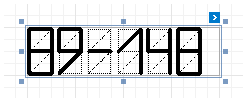Zip Code
The Zip Code control transforms its content into a zip code. The width of a Zip Code's segment is adjustable.

In the Property Grid, the check box control's properties are divided into the following groups.
Appearance
| Property |
Description |
| Background Color
|
Specifies the background color for the control. |
| Borders, Border Color, and Border Width |
Specify border settings for the control. |
| Foreground Color
|
Specifies the text color for the control. This option is also available in the Font
section on the ribbon. |
| Formatting Rules |
Opens the Formatting Rules Editor allowing you to choose which rules should be applied
to the control during report generation, and define the precedence of the applied rules. To learn more on this, see
Conditionally change a control's appearance. |
| Padding |
Specifies indent values which are used to render the contents of a check box. |
| Style Priority |
Allows you to define the priority of various style elements (such as background color,
border color, etc.). For more information on style inheritance, see
Understand styles concepts. |
| Styles |
This property allows you to define
Use odd and even styles for the control, as well as to
assign an existing style to the control (or a newly created one). For more information on style inheritance, see
Understand styles concepts. |
Behavior
| Property |
Description |
| Anchor Vertically |
Specifies the vertical anchoring style of the control, so that, after page rendering,
it stays attached to the top control, bottom control, or both.
|
| Keep Together |
Specifies whether the contents of the control can be horizontally split across pages.
In other words, if the control occupies more space than remains on the page, this property specifies whether this Zip Code should
be split between the current page and the next, or whether it will be printed entirely on the next page. This property is in effect only
when a Zip Code's content does not fit on the current page. If it does not fit on the next page either, then the Zip Code will
be split, despite this property's value.
|
| Scripts |
This property contains events, which you can handle with the required scripts. For more information on scripting, refer to
Handle events via scripts.
|
| Segment Width |
This property setting specifies the width of the lines (in pixels) used to draw the
numbers in the zip boxes of the control. |
| Visible |
Specifies whether the control should be visible in Print Preview. |
Data
| Property |
Description |
| (Data Bindings)
|
This property allows you to bind some of a cell's properties (Bookmark,
NavigateURL, Tag and Text) to a data field obtained from the report's data source, and to apply a
format string to it. |
| Tag |
This property allows you to add some additional information to the control; for example its id,
by which it can then be accessible via scripts. |
| Text |
The Text box should contain digits or dashes. Other characters are displayed as
empty zip boxes. |
Design
Layout
Navigation
| Property |
Description |
| Bookmark, Parent Bookmark |
These properties are intended for the creation of a hierarchical structure within a report called a document map. For an explanation
and help, see Add bookmarks. The Bookmark property can be bound to a
data field obtained from the data source. To do this, expand the (Data Bindings) property and in the Bookmark.Binding drop-down selector, select the
required data field. |
| Navigate URL, Target |
Use the Navigate URL property to specify a URL for web browser navigation when a user clicks a label. The web browser
displays a page in a window or a frame as specified by the Target property. Note that a URL must have an appropriate prefix (e.g. "http://"). You can
create cross-references within the report by assigning the name of the target control to the Navigate URL property, and setting the Target property
to "_self". For more information, see Create hyperlinks.The Navigate URL property can be bound to a data field obtained from the data source. To do this, expand
the (Data Bindings) property and in the Navigate URL.Binding drop-down selector, select the required data field. |

